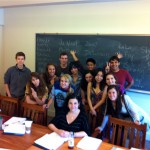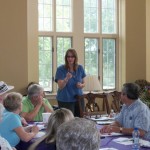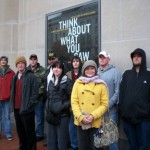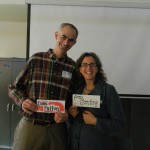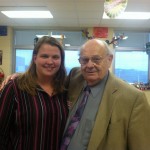Becoming a Holocaust Educator – a rural perspective
Forums › 2023 Summer Seminar › Becoming a Holocaust Educator 2023 Summer Seminar Responses: due JUNE 18 (or earlier) › Becoming a Holocaust Educator – a rural perspective
-
AuthorPosts
-
-
June 18, 2023 at 7:25 pm #31882
I was drawn to the chapters in “Becoming a Holocaust Educator” that were written by teachers in rural districts, similar to mine. I had a brief, but victorious, battle with book censorship this school year. The administration supported my decision to include “Maus” in my Holocaust and Genocide Studies class, despite an objection from a very vocal school board member (who, after admitting he hadn’t read the book, gave up the fight). I was saddened reading Risha Allen’s chapter, because she had created something really beautiful in her school only to have it ripped away by a handful of parents.
Corey Harbaugh’s chapter also spoke to me. He used a statistic that struck me: 60% of Holocaust education occurs in an English, not history, class (p. 55). I am a history teacher and I am sure that means I approach Holocaust education differently than an English teacher. I know it does as I have participated in other professional development opportunities and in reading the books required for TOLI. I have always subscribed to the notion that fiction has no place in Holocaust education. I was first told that by a G2 who was our guide to Holocaust sites in Europe in 2015 on teacher study tour, and continually reinforced in other PDs. I was glad to read Corey’s thoughts about “The Boy in the Striped Pajamas.” I struggled unsuccessfully for years to convince our 8th grade ELA teacher to not use the film. I had to “un-teach” much of what the film taught my students.
Finally, I was very moved by Sue Fletcher’s approach to Holocaust education. I use the Echoes and Reflections curriculum as my anchor in class and therefore video testimony plays a large role in how my students learn about the very personal tragedy of the Holocaust. Echoes also teaches the principle of “safely in, safely out.” In my small, rural school where most people have never met someone who is Jewish, we take the time to learn about pre-war Jewish life and Judaism today. I have been able to even invite rabbis into the classroom, which my students find very interesting.
-
-
AuthorPosts
- You must be logged in to reply to this topic.
Recent Replies
Recently Active
-
Active 1 day, 7 hours ago
-
Active 2 days, 10 hours ago
-
Active 2 weeks, 2 days ago
-
Active 3 weeks, 3 days ago
-
Active 4 weeks, 1 day ago
- View All Members

